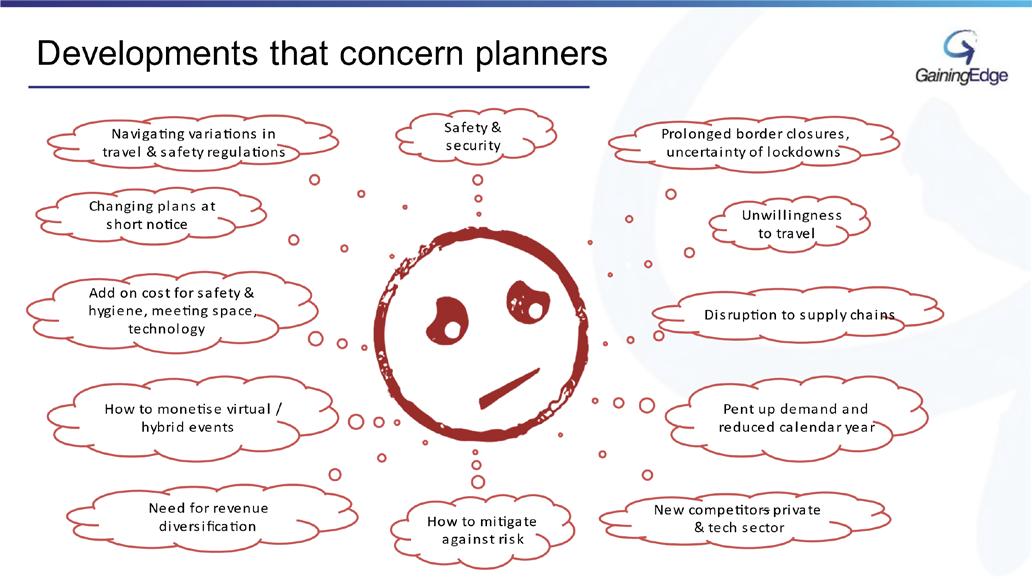What Meeting Planners Are Looking For
Meeting and event planners, like much of the business events industry, are facing many challenges during the ongoing pandemic that does not seem to have an immediate end.
Challenges
- Running safe events for their attendees.
- Navigating the variations in travel and safety regulations from country to country, from region to region and from city to city.
- Having to change plans at short notice from live events to hybrid, virtual, postponements or cancellations.
- Cost containment, taking into account the additional costs of safety protocols, technology and meeting space.
- Looking at ways to monetise virtual and hybrid events and diversifying revenue streams.
- How to mitigate against risk and becoming more agile to respond to ever changing circumstances.
- Negotiating more flexible agreements with the supply chain.
- How to plan ahead and become more sustainable during a period of prolonged border closures and unpredictable lockdowns.
- How to restore confidence in travel and mass gatherings.
- Dealing with a supply chain that has been dramatically disrupted.
- Adapting to new digital age.
- Competing against a number of tech companies that are investing in event management systems.
- Corporations have a duty of care to their employees resulting in more stringent travel and safety procedures.
According to the PCMA APAC COVID_19 Survey 2021 the two key areas of concern relate to safety and local support. They want to know that destinations have the right measures in place to contain the virus and to keep visitors safe. They are also looking for support and advice from DMOs and CVBs to minimise risk and to organise safe and successful events.
As they plan ahead meeting and event planners are looking to partner with destinations and suppliers to achieve mutually beneficial outcomes. They are in search of innovative ideas and solutions to meet today’s challenges.
Hybrid events are not likely to go away. It will be just a question of what proportion of attendees will be on-site versus virtual. Host destinations will need to invest and upskill in their technological capabilities to be able to marry virtual and live events effectively. Remote locations stand to benefit if they can enhance their technological and live event capabilities.
Virtual platforms provide an excellent platform for delivering year-round content and to achieve a much higher audience reach, many of which would not normally attend live events. Through AI technology virtual platforms can deliver more tailored content at a more convenient time to a specified target audience. Associations are already discovering how virtual platforms provide the opportunity for ongoing engagement with their members and communities.
Hybrid events also provide multi-channel platforms to address the variable preferences of their audience and can provide superior levels of data collection.
In the aftermath of COVID-19 destinations need to more clearly articulate the benefits of face to face events to encourage a return of foreign visitors to their shores. The on the ground experiences need to be more meaningful to accentuate the difference between virtual and on-site. On-site attendance creates better opportunities to immerse in the local culture, to network and build professional relationships, to exchange knowledge, to socialise as well as to create a more inclusive environment for delegates of all cultures to interact.
Planners will also be looking to negotiate more flexible terms and conditions across the supply chain and will look to DMOs and CVBs to keep them well informed of any disruptions to the supply network.
The pandemic has also created a number of new event opportunities within certain industry sectors such as healthcare and wellness, technology, sustainability, transport and logistics, online services, risk mitigation and social justice.
The role of the DMO and CVB has never been more important to keep the market well informed and to create innovative solutions that address the ongoing industry challenges and that leverage from the new opportunities being presented.

